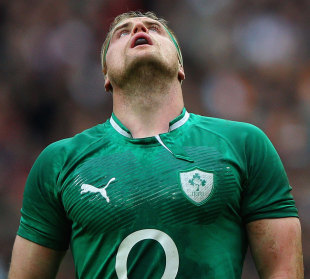|
Comment
Ireland's glass is half full
Hugh Farrelly
March 7, 2012

Ireland's Jamie Heaslip reflects on a Morgan Parra penalty in Paris
© Getty Images
Enlarge
In years to come, Ireland's performance in Paris will be rated among their finest, but the players and management were visibly crushed in the immediate aftermath. To put the 17-17 draw in context, Ireland have only two wins in 60 years of visits to the French capital - along with a record of first-half capitulations and shipping massive scores. Those victories came in 1972 and in 2000 (when Brian O'Driscoll scored his star-making hat-trick), but the tally from the other 31 defeats shows a points difference of 411 in France's favour, during which time Ireland managed only a measly 22 tries. Thus, striking for two touchdowns and a first-half lead of 17-6 last weekend was an exceptional effort by Declan Kidney's side and, though they were hanging on grimly at the end, they know they may never again be in such a strong position to put France away. That they did not manage it could have severe psychological repercussions, making it essential that Ireland park what happened in Paris and channel all their energies into building on the positives to round off their tournament with victories over Scotland and England. Easier said than done, particularly in light of the injury crisis that has robbed them of captain Paul O'Connell and developing scrum-half Conor Murray for the rest of the Championship, with doubts surrounding several other front-line players. Rory Best, the natural selection as captain to replace O'Connell, is nursing badly bruised ribs and battling to be fit in time for Saturday while Sean O'Brien is troubled by a foot complaint, with Keith Earls and Donncha O'Callaghan being monitored for groin and ankle injuries respectively. Ireland's resources were always going to be tested by the four games in four weeks schedule that was thrust upon them following the postponement of the original clash with the French. The fact this situation was not of their making makes it particularly galling and you do not have to possess a pair of green-tinted glasses to agree that not much has fallen Ireland's way in this Six Nations. First, they lost their best player and long-standing captain Brian O'Driscoll to shoulder surgery, then Earls was ruled out of the opening meeting with Wales after his new-born daughter fell ill. Ireland lost that match for a number of reasons, but a major one was the penalty awarded against Stephen Ferris for a tackle that was later deemed to be entirely fair. The flanker's citing and subsequent dismissal added to the disruption. Throw in the postponement, punishing schedule and some questionable refereeing decisions by Dave Pearson last week in a match that finished with a penalty count of 12-4 in France's favour and Kidney could justifiably wonder if the rugby gods hold something against him. On the flip side, that postponement allowed Ireland to find some form against Italy and there could also have been a couple of yellow cards awarded against them in Paris that they would not have been able to argue with.
Throw it all together and the glass half-full approach is the only way to go for the Irish as any sense of doubt or reticence against Scotland could be punished. Two years ago, Ireland were expected to clinch the Triple Crown and bid farewell to Croke Park with a routine win over the Scots only to be stunned by a classic away-day mugging, inspired by the Scottish back-row. That was in the era of the 'Killer Bs' and though John Barclay is the only survivor from that trio this weekend, it is still a formidable unit. They have yet to record a victory, but Scotland are developing greater belief as they have grown into the Championship. Aside from Rory Lamont's broken leg, their injury situation has also been more than manageable and Andy Robinson will sense an opportunity in Dublin on Saturday. It is up to the Irish to stop it at source. Even with their injury concerns, Ireland can still line out a team that should be too powerful for the Scots. They should take strength and confidence from their European experiences with the provinces, where Scotland-Ireland contests in the Heineken Cup are seen as points in the bag for the Irish. That does not mean taking the Scots for granted, that lesson was learnt in 2010, but Ireland should take heart from the fact that Scotland have only scored four tries from their last five visits to Dublin while their hosts have accumulated 17. The visitors are a more dangerous outfit with Stuart Hogg and Lee Jones on board but Ireland's defence in Paris, where they rediscovered the power of good line speed and the use of shooters, was superb and in the exceptional Rob Kearney and try-hungry Tommy Bowe, they have the men to inflict pain on the scoreboard. So, even allowing for all the disruptions, Ireland have the potential to finish the tournament strongly with three victories and a draw representing a decent return. Paris may go down in history as an opportunity squandered but it also pointed the way towards a brighter future. © ESPN Sports Media Ltd.
| |||||||||||||||
Live Sports
Communication error please reload the page.
-
Football
-
Cricket
-
Rugby
-
- Days
- Hrs
- Mins
- Secs
F1 - Abu Dhabi GP
Abu Dhabi Grand Prix December 11-131. Max Verstappen ()
2. Valtteri Bottas (Mercedes)
3. Lewis Hamilton (Mercedes)
4. Alexander Albon ()
5. Lando Norris ()
6. Carlos Sainz Jr ()
-
ESPNOtherLive >>
Golf - Houston Open
Snooker - China Open
Tennis - Miami Open

